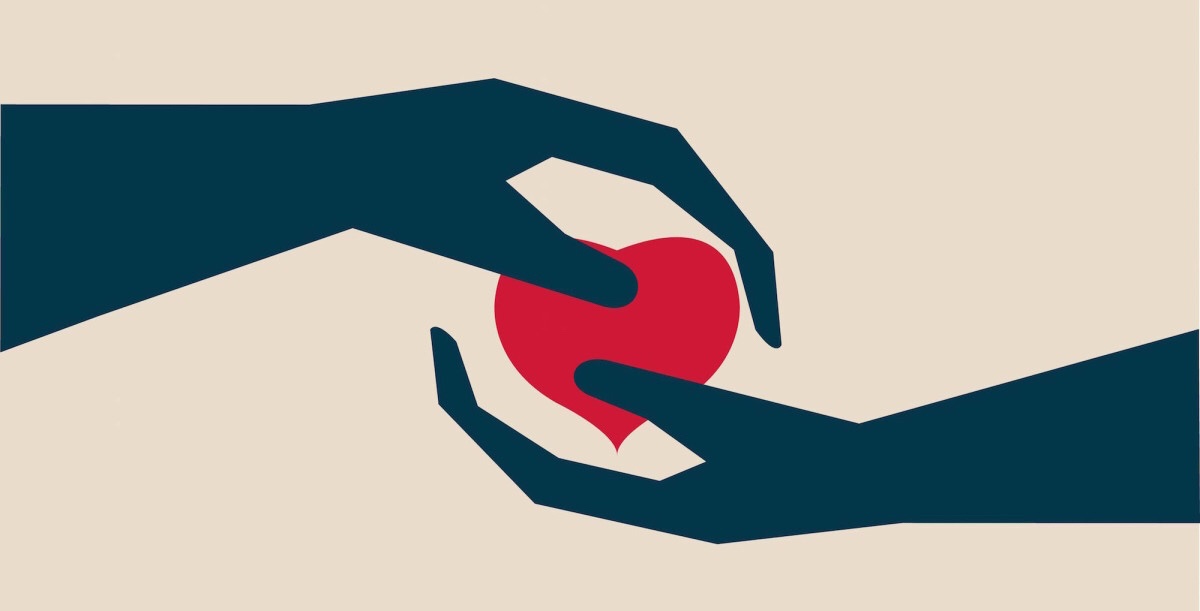Very occasionally an entry in the Self-Reflection category begins with a warning – or at least a cautionary note – that the contents are more sensitive than other content, and will not be to everyone’s taste or interest, even for those who otherwise follow the posts in this personal category. This post certainly fits into that category – today I’m talking about “non-traditional” relationships and my thoughts on life and living. If you aren’t deeply interested in my love life or the ins and outs of my marriage, now’s the time to take your leave, and I don’t fault anyone for doing so.
Over the past several months my wife has invited me to attend a local relationship talk group, where each session is a round-table discussion about the challenges, successes, and situations that can come along with having an open, casual, or polyamorous relationship, particularly in a society where such is often heavily stigmatized.
Note: throughout this entry I’m going to use the term “open” relationship as an all-encompassing catch-all for situations or scenarios that involve, or could involve, more than two people. Most specifically because the above terms, among many others, mean many different things to different people, and can carry unintended or societally-encouraged baggage along for the ride.
The two primary reasons I haven’t made the time or effort to attend these meetings include that my views on relationships and partnerships is fairly straightforward, and also that I’m genuinely not interested in hearing about the (inter)personal lives of very many other people. Over the past year or more I’ve become something of a hermit, which couples with a “live and let live” philosophy where I don’t have the need to control (or in many ways, contribute) to others’ lives or decisions unless expressly asked.
When it comes to my thoughts on what it takes to make a relationship work, I’ve written before that for me it all boils down to trust and communication. Whether a relationship is a monogamous pairing, a casual fling, a deep friendship, or a 1970s free-for-all, in my opinion all forms of intimacy – even those that aren’t physical in nature – rely on the same general guidelines. Trust and communication are an ouroboros, each relying on and growing the other, and different people (as well as different relationships) have different amounts of both they need in order to thrive.
Over the past decade or so I’ve become much less judgmental in regard to others, and I see that as a good thing. What people do in their own homes, so long as it doesn’t hurt others, is their own business. Who am I to pass judgment on what other people find interesting, stimulating, or fun? While some people may assume I’m talking about fetishes or other avenues for sexual exploration, honestly I’m referring to most aspects of others’ lives. I don’t begrudge people who spend their time learning how to throw playing cards any more than those who read whole libraries’ worth of books. Some people are very particular about how their yard looks while others want to spend their time sleeping. Who am I to say that there’s a “right” or a “wrong” way for others to spend time or find satisfaction in life?
Very similarly, I have no interest in passing judgment on respectful relationships between consenting adults. Someone who identifies as straight but has a one-off partner of the same gender? Knock yourself out, have fun. Someone else has intimate dates with four different people in a week? Good on you for enjoying being social. In a monogamous relationship where the thought of flirting with others is a no-no? It’s fantastic that you have established boundaries. Not only do I not find anything wrong with these (or most other) relationships, I don’t think it’s my place to tell others how they should or should not live their lives.
In the past I’ve been asked if I look down on “traditional monogamy” because I’m supportive of my wife flirting with, playing with, and even being in relationships with others. Honestly, not at all. Not only are some relationship types suited for certain individuals, some relationship types are well-suited for specific relationships. By that I suggest that while a person may prefer or find value in a particular type of relationship, what works for the individual may be different than what works for the pair – two open-relationship proponents may find themselves wanting a closed relationship, or the reverse, and that’s okay.
In some respects I believe America has grown more tolerant of, or at least more accustomed to, “alternative” lifestyles in the past several years. Whereas when I was growing up calling someone “gay” was a damning insult, now television shows like Queer Eye for the Straight Guy are regularly at the top of the polls, and I’m glad to say that my own beliefs and thoughts have progressed as I’ve grown up and seen more of the world. Even with increased acceptance however, it’s not to say that there’s overwhelming approval.
There are many examples of open relationships not working, of jealousy and secrecy ripping two or more people apart, and these are often pointed to as examples for why the very idea of non-traditional (meaning non-monogamous) relationships can’t work. By that same logic, one could point to the many, many, many more examples of “standard” relationships failing and declare exactly the opposite – it’s just that one side of the coin has been long-normalized in our society. I always refer back to the two cornerstones of any relationship, trust and communication. Without those, any relationship is doomed to failure, no matter its classification or lack thereof.
Holding true to a decision I made when I first started dating, I was a virgin when I got married. Did my making that decision mean I expected the same of my future spouse or anyone else? Absolutely not. The decisions I make for myself shouldn’t have a repressive impact on those around me. In fact, I went so far as to assure my girlfriend (then fiance, now wife) that if she needed or wanted things I couldn’t provide, I was accepting and understanding of her finding it elsewhere. Even today in our marriage there are kinks or experiences that one may enjoy or want to explore, that the other may not be enthused about. We support each others’ exploration and pursuit of wants and desires, and I think having both that mutual respect and trust is such a key aspect of what makes our relationship work.
Some months back I wrote about a co-worker who turned down a lunch invitation with me because she felt it wouldn’t be appropriate, in regard to her husband. I hadn’t intended it to be anything beyond coworkers having lunch and getting to know one another outside of the office, but I wasn’t offended or aghast at either the implication or the boundaries that they had set. As much as I may tease and flirt with some (select) people, the truth of the matter is I never want anyone to break or violate the boundaries they have either for themselves or their relationships, let alone be the cause thereof.
I try to avoid labeling my marriage as “open” or “polyamorous” or anything of the sort because those words automatically bring stigma and assumptions about who we are and what we have, and different people interpret those words very differently. As much as I prefer to have things neatly categorized and labeled in many other aspects of my life, when it comes to our marriage, that in and of itself is the classification: our marriage. My wife and I have the boundaries we’ve set and agree upon, both based on our own comfort levels and respect for the other person’s wishes, and really that’s all I need to think about. I love her, I trust her, and I know that she would actively listen to any concerns, desires, or changes I wanted to discuss. I figure that’s enough, without needing to conform to anyone else’s idea of what a marriage “should be.”
It has been said that the complexity of a relationship is equal to the number of people involved, squared. Put more simply, a relationship involving three people is more than twice as complicated as a pair. I think I agree with on the abstract idea that while complexity increases with participants, it doesn’t mean that the relationship by necessity becomes more complicated, if that makes sense. More individuals means more communication, trust, and (potentially) boundaries necessary to maintain a positive experience, but that doesn’t mean that each individual connection spirals out of control.
I know several people who, in an effort to save a flagging relationship, added a third person to the bedroom. Anecdotally I have seen this fail 100% of the time, because adding a person – adding complexity – doesn’t fix underlying problems. Instead, it amplifies them, particularly when it comes to trust and jealousy. Years ago I heard an adage that “threesomes strengthen strong relationships and break weak ones.” I don’t quite think it hits the mark, but I can see where they were headed and agree with the general principle that it takes strength to weather new opportunities and challenges.
In the past, my wife and I have invited select others to our bed, either as one-off encounters or repeatedly, both as a way to express our mutual attraction for the other person as well as to try new things that wouldn’t quite fit within the bounds of our marriage. We’ve also both entertained extramarital relationships, separate from each other. While it has been some years since I saw anyone else romantically, she recently spent a week with her girlfriend, enjoying being on vacation and spending time with her. Am I jealous? Honestly, no I’m not. I may envy that she has such a special connection with another friend and was able to go on that adventure, but I don’t feel threatened or less of a person because she enjoys spending time with someone else – in no way does that mean she doesn’t like spending time with me, or that she doesn’t value me as a partner, or that I’m somehow inadequate for her needs.
I suppose I find it silly to think of love as a finite resource. If I love someone, I love them, and that doesn’t have any bearing on others or other relationships I may have. I can simultaneously love my wife and love a close friend, without either relationship blowing up or being in contention. I don’t see emotions as walking a tightrope, needing to be carefully balanced or really having a determined destination in mind. Much as having multiple close friendships, the fact that I care for one person doesn’t say anything about my capacity to care for another.
This post is easily the longest I’ve written about the topic in one sitting, and for some readers it may be the first time they’ve learned some things about my marriage, my outlook, and my personal beliefs. Some may see my general laissez faire attitude and assume I don’t care about a lot of things, when the truth is that I care very deeply about the right for everyone to explore life and find what excites and drives them, in their own way and at their own pace. Some people never stop looking and I think that’s fantastic. Some people find a place of comfort and declare “this is perfect for me,” and I think that is also perfect.
Largely I think I don’t talk about relationships often because I don’t feel that my outlooks should have bearings on others’ view of the world. Let each live their own life, I suppose, and only interject when I feel someone is in true need or asks for my advice. Feeling content and being content are two different things, but from my external perspective, who am I to judge that someone isn’t as happy as they should be?
I’ve always said that I’m an open book, willing to answer any question put to me. It’s a point of pride, and I’m still willing to do so – if someone has the courage or moxie to ask a question, no matter how personal, and assuming they’re genuine in the asking, I think they deserve an answer. That doesn’t mean I think it’s right to paint others with the brush of my own experiences.
It is my hope that these words are taken as my personal reflections on what works for me and how I view the world, and not some recipe for eternal joy and satisfaction. What works for me isn’t guaranteed or even likely to work for others, and I highly encourage everyone to find what works for them, and to not be afraid to stretch and try new things, if that’s what they want.

















